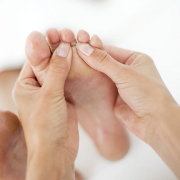 iStockphoto/Thinkstock
iStockphoto/Thinkstock
Sciatica pain may be the result of another medical issue. According to the U.S. National Library of Medicine, “Sciatica is a symptom of another medical pr oblem, not a medical condition on its own.”
Sciatica pain differs from person toperson mainly because the causes of sciatica differ.
For example, if you have pain on one side of your butt and hip, this may be the result of inflammation of your piriformis muscle.
Inflammation of the piriformis (pronounce peer-ee-form-us) muscle, also known as piriformis syndrome, can put pressure on your sciatica nerve, resulting in sciatica pain. This literally results in a pain in the butt, or hip.
The American Academy of Family Physicians stated that the “piriformis muscle runs from your lower spine to the top of your thigh bone.”
Symptoms of piriformis syndrome include:
• Sciatica pain
• Pain and numbness in your lower body
• Pain, tingling or numbness that starts in your buttocks and runs down the back of your leg
• Intense, burning pain deep in the buttocks
• Pain increases with activity sitting, walking up stairs or running
Now, here are some recommended homecare tips if you are suffering from piriformis syndrome:
• Take an over-the-counter pain reliever like acetaminophen, ibuprofen, aspirin or naproxento to reduce the swelling and pain.
• Do not sit for a long periods of time. Regularly stand up, stretch and walk around.
• Try piriformis muscle stretches.
• Massage the affected area.
• Temporarily halt physical activities which irritate the piriformis muscle.
• Use cold packs and warm packs. Start by using a cold pack on the affected area several times a day for about 15 minutes at a time. After using a cold pack for a couple of days, switch to a warm pack or heating pad. If pain continues, alternate between a cold pack and a warm pack.
According to the American Academy of Family Physicians, here are some prevention tips to avoid piriformis syndrome:
• Avoid sitting or lying down for long periods of time in a position that puts too much pressure on your buttocks.
• Don't lift by bending over
• Lift an object by bending your knees and squatting to pick up the object. Keep your back straight and hold the object close to your body. Avoid twisting your body while lifting.
• Exercise regularly
• Maintain good posture when you are sitting, driving or standing
You should contact your doctor if your pain lasts longer than two to three weeks. Also, contact your doctor immediately if you experience sudden or severe pain in your lower back or leg, issues controlling your bladder or bowels, or if the pain begins after a traumatic accident or injury.
The FamilyDoctor.org website stated, “Failure to treat this condition can lead to permanent nerve damage, so be sure to follow your doctor’s instructions.”
References:
Piriformis Syndrome | Overview -- FamilyDoctor.org. Health Education | Illnesses, Diseases & Conditions -- FamilyDoctor.org. Retrieved June 27, 2012, from
http://familydoctor.org/familydoctor/en/diseases-conditions/piriformis-syndrome.html
Piriformis Syndrome - Symptoms, treatment, stretches & exercises. Virtual Sports Injury Clinic - Sports Injuries, Treatment, Exercises, Sports Massage. Retrieved June 27, 2012, from
http://www.sportsinjuryclinic.net/sport-injuries/hip-groin-pain/piriformis-syndrome
Sciatica - PubMed Health. National Center for Biotechnology Information. Retrieved June 27, 2012, from
http://www.ncbi.nlm.nih.gov/pubmedhealth/PMH0001706/
Reviewed June 27, 2012
by Michele Blacksberg RN
Edited by Jody Smith





Add a CommentComments
There are no comments yet. Be the first one and get the conversation started!